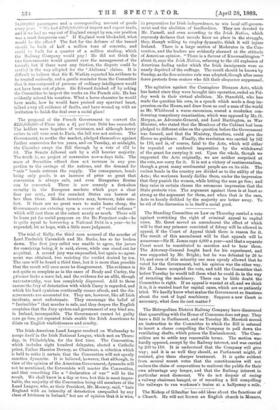The Standing Committee on Law on Thursday carried a voter
against restricting the right of criminal appeal to capital cases. Mr. Gorst moved an amendment the effect of which will be that any prisoner convicted of felony will be allowed to - appeal, if the Court of Appeal think there is reason for it- The result of this amendment will be that appeals will be numerous—Sir H. James says 4,000 a year—and that a separate Court must be constituted to sanction and to hear them. The Attorney-General fought hard for his experiment, and was supported by Mr. Bright; but he was defeated by 28 to 19, and even of this minority one man openly allowed that he voted for the Government, but his opinion was the other way. Sir H. James accepted the vote, and told the Committee that beforeTuesday he would tell them what he could do in the way of recasting the machinery. There can be little doubt the Committee is right. If an appeal is wanted at all, and we think it is, it is wanted least for capital cases, which are so patiently tried. We hardly know what makes the Government so fractions about the cost of legal machinery. Suppose a new Court is. necessary, what does its cost matter ?


































 Previous page
Previous page